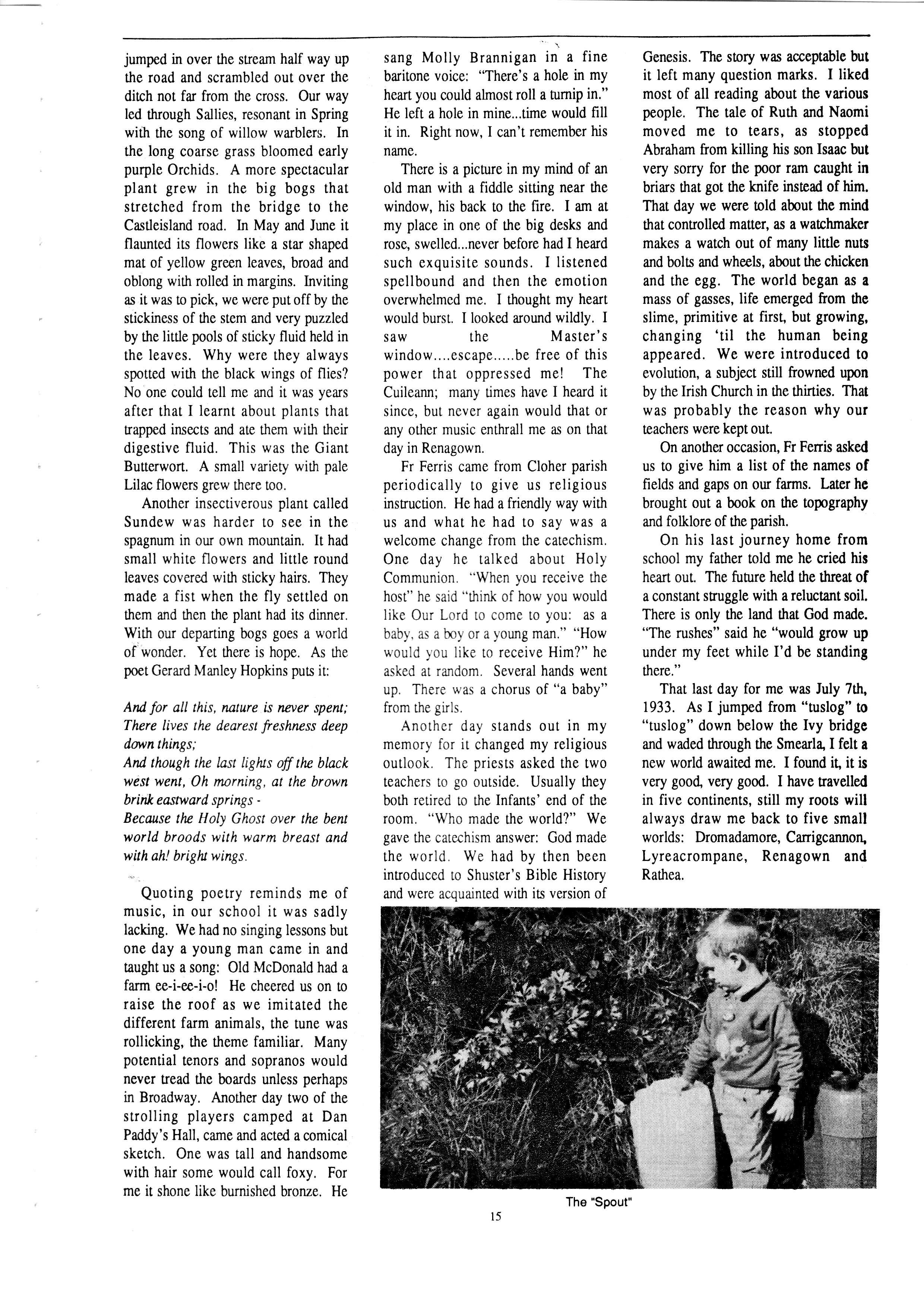
4 minute read
At what time of the day do
by Sr Brighid MoloneY
Sr Brighid MoloneY
Advertisement
It was a summer's morning and I wad very young. Holding my grandfather's hand, he was Pats
Moloney, I set out from ow home in
Dromadamore on the right bank of the Smearla. Near the bridge we came
upon'a trench dug deep and partly filled with muddy water. Granda walked
along the edge of it carrying me on his back.
Two more trenches blocked our way to the cross, then we took the road to Castleisland. At this point I recall a newly fenced "ditch" with now and
again little tricolour flags flying from
short poles. We came o a boreen that went up trc a long tharched farmhouse. The woman of the house came to the half door and welcomed us into the warm kitchen, too warm for the day that was in it. Granda drew his chair down to the dresser. Nora (Frey) McMahon then treated us to
refreshments. I remember that big while cup, deep and wide filled with creamy cold milk and being aware of the warmth and kindliness of the
woman who gave it to me,
The school house a few yards further on was our next stop. We
climbed the broad flag stone steps and entered. The Mester, Danny O'Connor at the far end conversed a while with Granda and put a silver coin in my
hand. Granda led me up the aisle by the "small desks" where sat the juvenile scholars. Suddenly I felt a
hand snarched a bit of silver but I was too shy to even tum my head. At the big table Granda stood talking to the "Missts", Maggie Molyneux, who was the Master's wife. My robbery went
unreported. Hopefully for his/her own good the
young thief did later learn and keep the seventh
commandment.
It was in 1924 that I became a pupil al Renagown National School. Time has
obliterated the events of that day, two things sand out cleuly: my new Pink gingham dress with pockets and the other little new girl,who had
dusky wavy hair and big grey eyes. Bridie Brosnan and I
became friends for life.
A stone high up on the wall of the one roomed schoolhouse bears the inscription: Renagown National
School, 1894.
It was not the first school in the area. My grandfather had gone to a hedge school run by his uncle. It was a cattle shed on our land, later the site of Connie Brosnan's forge. It had to be cleaned out by the scholars on their arrival. Fresh rushes were strewn on the floor and the class sat cross legged holding their slates and books on their knees. They learnt the three R's reading, 'riting, 'rithmetic; the Latin roots of the words in English; the
words of the hymns of the esablished church: "Praise to the lord's anointed" was the one Granda would recite, all about the exploits of King David in
Israel long age. Doubtless, the master could not afford to be choosy, books were hard to come by. For Catholics, 0re bible was a forbidden book, so the scholars would have their only chance of an introduction to a key figure in the OldTestament,
The leaming of poems by heut was given primary importance. It helped o perpetuate the old bardic tradition.
Some memorable ballads and rhyming couplets were composed in the silence of the moorlands or spontaneouslY
when occasion arose. My grandfather had some anecdotes about the landlord, Mr Hurley, wih whom we ue proud to be on friendly terms. They were walking along Denny Street one "Ah! You're a cad yourself" said
Hurley walking up to him. The vendor put down his basket, faced tlre landlord squuely and declued "Sir! There uc cods on sea, and cads on land,but this is the real genuine cod!"
There was one Micky Collins who needed leather and ravelled to Tralee to purchase it at Hill's but Mr Hill for some reason was unwilling o sell. In a rage Micky spat out a rhyming couple[
Between Hill and Hell there lies but oru letter, But if Hill went to Hell Micky Colliw will get leather!
After practice on the slates with
slate pencils from ttre Smearla gravel, there were headline coPy books, ink and quill pens. These wore out in time and then you brought your own goosc quill and learnt how to shape the nib with a penknife. Pats loved a joke,
practical or verbal. One morning orr of the boys whose name I have
forgotten, splayed ttre nib of his quill, reducing its efficiency to punishmen$ level. "Give it to me" whispered Pats "and I'11 WELD it!" He had leunt about the skill of welding from his
father Jerh who on one of his journeys to Cork had even brought back a
WOOD's mowing machine. It was hc first to be seen in the district. The
scythesmen uavelled from fu and neu to view this wonder. They shook their heads. Would it cut the hay as good u a srythe?
It would be much later that steel nibs became available. Young Pats learnt to write a beautiful copperplate
hand,thick on the downstrokes, thin on the up strokes, with frequent capitals executed with a flourish. In his old age he would hold the pen delicately, circling it over the page before
fashioning the fint whorled majuscule. He had a wide repertory of songs, stories and recitations. On the long winter nighs the ramblers would join us round the hearth to listen to him singing: The weuing of the green" The bright silvery light of 0rc moon and a tender one about a maiden "with her shoulder to the door." One recitatio4: "The monkey and 0re man condemned the banishment of a banel organ player




